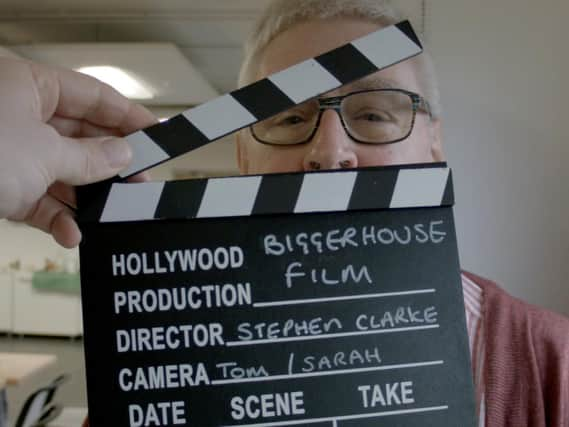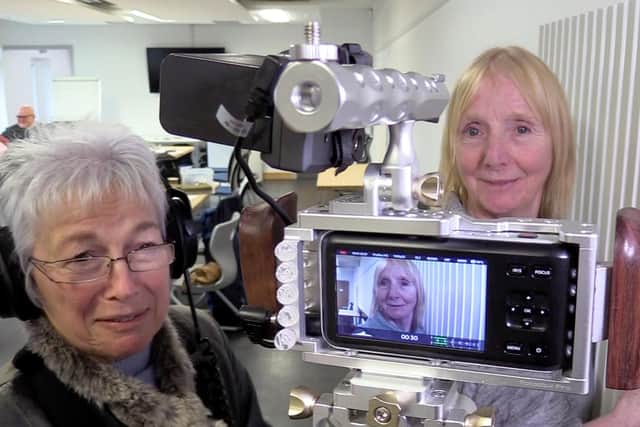Bradford group's hopes that film project will highlight ups and downs of life with dementia
This article contains affiliate links. We may earn a small commission on items purchased through this article, but that does not affect our editorial judgement.


Kit Swann is keen to share with me the song he and his wife Julie were listening to on the night before we speak. It is a song exploring feelings around a HIV positive diagnosis, but, says Kit, the lyrics of Say It’s Not True, written by Queen drummer Roger Taylor, resonate much more widely.
“When you listen to the words of that, it could be about anybody who’s got some sort of condition,” he explains. “It says whilst it’s happened to you, it could happen to me and it could happen to anybody. It’s quite a poignant song really.”
Advertisement
Hide AdAdvertisement
Hide AdIt certainly strikes a chord with the couple, who live in Queensbury, Bradford. Former district nurse Julie, 66, was diagnosed with mild cognitive impairment nine years ago, after realising she was becoming more forgetful. In March last year, that diagnosis changed to Alzheimer’s disease.
“Julie was devastated by that,” 69-year-old Kit recalls. Throughout her career, she’s seen first-hand people living with dementia and memory problems. “She has deteriorated slightly over the past 12 months or so as well. That’s the nature of the beast really. You’ve just got to give support when you can and accept support from other people.”
Since October last year, Julie and Kit have been attending the Pathways group in Bradford, which offers peer support for people who developed dementia whilst of working-age, and their partners or carers.
“At the time, those people might have had mortgages, they might have had dependent children, different financial outgoings to an older person,” explains one of the group’s lead volunteers Clare Mason. “When people are older, they’ve often retired before they develop dementia. People in our group, many of them have started with young onset dementia when they’re still working.”


Advertisement
Hide AdAdvertisement
Hide AdThe group meets monthly; those attending can speak to others in a similar situation, providing information and support. There are regular speakers and activities, as well as social outings and an annual holiday.
“I really wasn’t too bothered about going [when I first heard about it] because I felt that we could cope okay,” Kit admits. “We were getting out and about, we were going on holiday, we were socialising with friends and I didn’t think there was a need to get involved.
“It’s probably the best thing that we’ve ever done. Julie is meeting people with similar issues to herself. I’m meeting people who are either directly supporting people with memory problems or helpers that are there to support everybody else. It’s a wonderful, very friendly group. You look forward to being involved with all the interactions going on. It’s really nice to be part of it.”
The group itself is part of the Dementia Engagement and Empowerment Project (DEEP), a UK network of ‘dementia voices’, made up of groups around the country. Several of these, including Pathways, have recently been involved in a programme supported by The National Lottery Community Fund, producing a set of 22 powerful, short films between them.
Advertisement
Hide AdAdvertisement
Hide AdThey showcase the myriad ways in which people are living with dementia, showing that while a diagnosis might be life-changing, it need not be life-ending. They contain messages of joy and sadness, and of hope and wisdom, with the power of peer support being a thread running throughout many.
People with dementia are not just the subject of the camera’s gaze, they have produced the films too, working with Biggerhouse Film to operate clapper boards, cameras and sound recording equipment.
“I think the film project is one of the best things we’ve done,” says Clare. “There’s always a lot of debate about whether people with dementia can learn new skills and this proves they can with the right support in the right environment.
Clare’s father Trevor Aykroyd is among those featured in the films. He has vascular memory problems and has had four strokes since the age of 26. Clare says that growing up experiencing this meant she felt she had a connection with people with dementia. She felt she understood difficulties such as short term memory loss and how people can lose their occupations through not being able to work.
Advertisement
Hide AdAdvertisement
Hide AdShe spent 12 years working in various roles with the Alzheimer’s Society and is now a dementia care trainer and patient and public involvement lead in the Centre for Applied Dementia Studies at the University of Bradford.
She’s been involved in Pathways since its early foundations around 20 years ago and says, as well as providing friendship and support, the rewarding role reminds her of the value of her work and of why research, education and training in dementia is so important.
“Although everybody’s problems are different, they’re not unique. Most people have experienced them in some sort of way so we share ideas, share experiences,” she says of the support group.
“Sometimes there isn’t an answer, it’s just a case of saying it’s awful, I agree, but we’re in it together. I think that’s one thing the films show - the friendships, the togetherness, the laughter. We have a lot of that. We laugh together and cry together.”
Advertisement
Hide AdAdvertisement
Hide AdPathways volunteer Ron Hamer is among those to feature in the films. He’s been involved in the group since the beginning after his late wife Brenda, who sadly died in 2000, was diagnosed with Alzheimer’s disease.
Brenda, who worked as a nurse, was 52 when she received her diagnosis. “Life was not easy and she did deteriorate,” says 77-year-old Ron, who lives in Wilsden. Accessing information was difficult then, he claims, with fewer resources available for younger people with dementia.
Pathways has brought him much friendship and he says it’s nice to be able to offer support and “be part of an organisation that I understand”. “There are lots and lots of other people who are going through the same sort of things that I went through 20 odd years ago," he says.
Michael Andrews, 60, lives with Posterior Cortical Atrophy, a rare form of dementia and is also among those featured. In his film, he talks about how playing music gives him "release", though it's something that brings its own challenges.
Advertisement
Hide AdAdvertisement
Hide Ad“I think it’s because I’m trying to concentrate on what I’m playing so I tend to forget about dementia," he says. "But the problem I have is that I can start on one tune and finish on something totally different and I won’t realise I’ve done it, because some might have the same sort of beat in them.
“I can’t read music now so I’ve got to play by ear. I’ve also lost the ability to coordinate both hands together...You know how they say you get better with practice, with me it doesn’t matter. I could sit and play a whole day and then the next day it’s like learning again. I’ll have forgotten some of the tunes or some of the notes.”
Julie’s film captures her love for dancing and the endearing relationship between her and Kit. When we speak on the phone, she turns to him and says: “I think you’re lovely. You’re my man. You do help me.”
Sometimes, she tells me, she gets and angry and frustrated with him for no reason “and then I feel awful that I’ve shouted”.
Advertisement
Hide AdAdvertisement
Hide Ad“I think it must be very difficult for people with memory problems,” Kit interjects, “when they’ve always been able to do things independently and make decisions for themselves and then over a period of time, they can no longer do that.”
“It’s very frustrating,” Julie agrees. “You don’t know what to do. It’s very difficult but there’s nothing I can do about.”
“I think what helps Julie is the personality that she’s got,” Kit tells me. “She’s always been friendly, outgoing and cheerful and happy. Whilst she’s not always like that now, it’s still there in the background, which probably helps her along and helps me along really.”
The filming for the project took place over three days - one session at the university before Christmas, and two at Bradford City Hall before the coronavirus lockdown earlier this year.
Advertisement
Hide AdAdvertisement
Hide AdPlans to take the films to a festival, and for Pathways’ members to meet the other groups involved, have been put on hold as a result of the virus. But Clare hopes they can be picked back up again and that the films can be used to show the realities of life with dementia.
“Our hopes for the project is that it raises awareness of the highs and lows and of the value of peer support. The films demonstrate really beautifully how people can help one another and also that there’s fun to be had after diagnosis.”
To see the films, visit www.dementiavoices.org.uk/deepmoments
For more stories from the YP Magazine and The Yorkshire Post features team, visit our Facebook page.
Advertisement
Hide AdAdvertisement
Hide AdEditor’s note: first and foremost - and rarely have I written down these words with more sincerity - I hope this finds you well.
Almost certainly you are here because you value the quality and the integrity of the journalism produced by The Yorkshire Post’s journalists - almost all of which live alongside you in Yorkshire, spending the wages they earn with Yorkshire businesses - who last year took this title to the industry watchdog’s Most Trusted Newspaper in Britain accolade.
And that is why I must make an urgent request of you: as advertising revenue declines, your support becomes evermore crucial to the maintenance of the journalistic standards expected of The Yorkshire Post. If you can, safely, please buy a paper or take up a subscription. We want to continue to make you proud of Yorkshire’s National Newspaper but we are going to need your help.
Postal subscription copies can be ordered by calling 0330 4030066 or by emailing [email protected]. Vouchers, to be exchanged at retail sales outlets - our newsagents need you, too - can be subscribed to by contacting subscriptions on 0330 1235950 or by visiting www.localsubsplus.co.uk where you should select The Yorkshire Post from the list of titles available.
Advertisement
Hide AdAdvertisement
Hide AdIf you want to help right now, download our tablet app from the App / Play Stores. Every contribution you make helps to provide this county with the best regional journalism in the country.
Sincerely. Thank you.
James Mitchinson